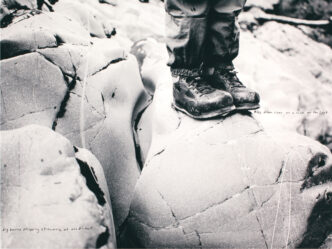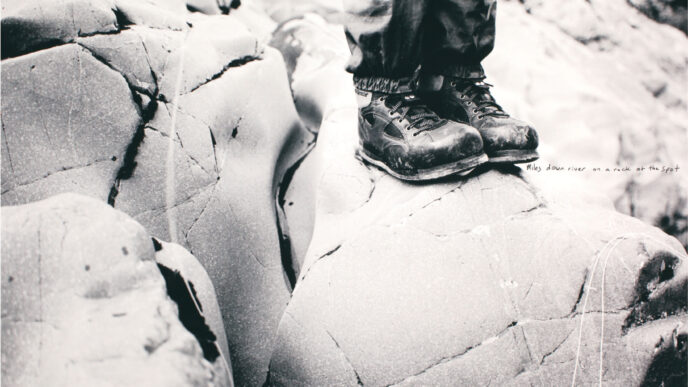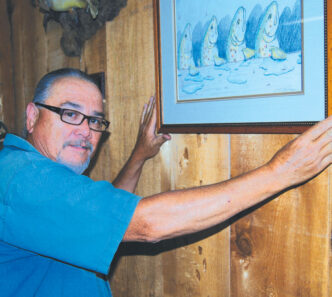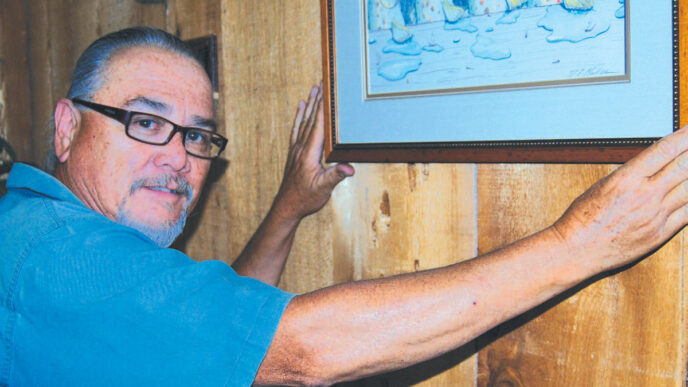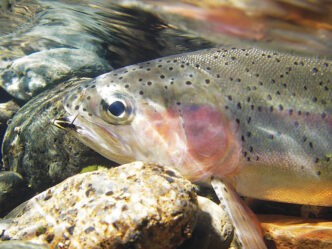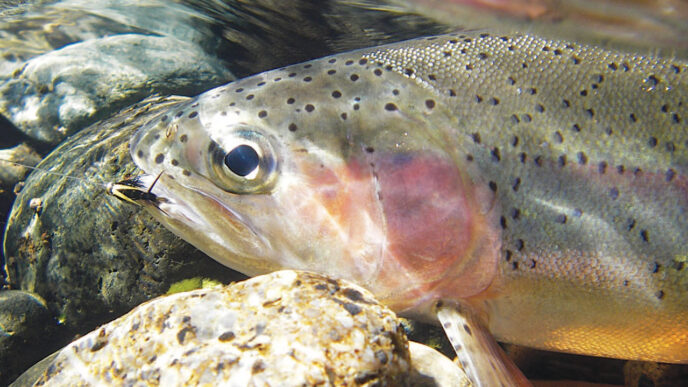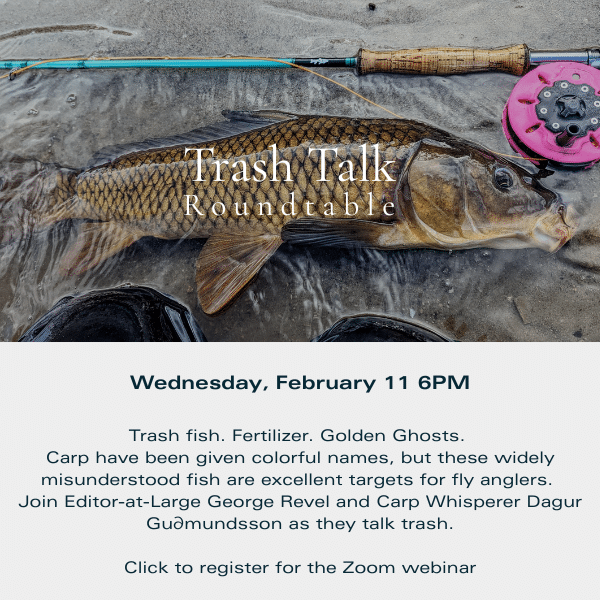Early this month, Mike, Rick, and I brought 117 years of smarts about fly fishing for bass to a local lake. We’d agreed the night before that conditions were perfect for a prespawn angling explosion.
They were. The lake didn’t explode, however. Maybe it had exploded the week before. Possibly something had exploded in the lake. All I know for certain is that every largemouth in the lake kept its maw shut, and despite arriving to find everything as we’d hoped, after a minute spent surveying the place, I knew we might as well head to Burger King to cast for fries in the parking lot.
I write “knew.” I did, unless a conviction doesn’t count when you haven’t a clue why you’ve reached it without a single conscious reason.
A hunch, in other words. And intuition’s an odd animal, you bet. It’s suspect to any substantially rational person. As much as we’re tempted to indulge gut guessing in life and fly fishing, we know better than to rely on subjective responses that conflict with reasoning based on observable facts. We’ve all been wrong too many times, witnessed other folks’ awful errors — it turns out emu was not “next year’s beef ” — so remind ourselves that unsupported certainties often spring from assumptions we’ve failed to recognize and examine. We weigh evidence, consider what’s at stake and the consequences, and are cautious about self-fulfilling prophecies that influence everything from sugarpill effects on headaches to how well we fish a fly we don’t yet trust.
We’re cautious. And yet, when things are not critical — while fly fishing, for example — we may indulge a little. There’s hardly a trip when I haven’t tried an odd tie or tactic, if what should be working isn’t, also when things work so well I want to try new tricks.
Even so, I cannot remember one time in my life when I walked away from fishable water because I “sensed” something was off.
I certainly didn’t when we fished that bass lake.
Rick launched an elegant sailboat hull-modified-style pram he’s handcrafted from clear cedar. Mike mounted a fat, yellow plastic sit-on-top kayak, while I, always a whore to fashion, submerged to my pecs in the hole of an inherited U-shaped float tube that on good days supports three beadheads and a split shot. For hours, we bobbed about, trying many of the eleven thousand flies we carried, stripping sinking, intermediate, and floating lines around coves and off points, into and across channels, at a large beaver mound, and, occasionally, casting to no place in particular on general principles. Except for two dwarf perch that struck Rick’s nymph out of pity, we touched nada se nada. Neither did any of the gear guys who, deluded as we were, tossed plastics and spinnerbaits from decks of freshwater Ferraris. On this day, hoping a bass was a fish of thousand casts was a pipedream.
Naturally, we stayed until dark, hoping things would change. They did: it got colder and harder to see things. By then, my neoprenes were leaking along a crotch seam, which for some reason caused me to whistle sharply when I inhaled, not always through my lips.
Yes, well, “That’s why they call it ‘fishing,’ not ‘catching,’” yada yada. And it was a fine afternoon turning into night. I hadn’t seen Rick in awhile, and we got to talk some on the water and after. An excellent fisher, Rick’s both a retired pharmacist and a historian of the drug industry, and his stories of Big Pharm’s machinations will convince you we should expand the Second Amendment to include nukes. Mike’s had his own issues with medicine recently, as have I, so after some satisfying venting, he invited me to continue steaming at his new digs, a workshop and loft converted from what was once a farm’s two-story commercial chicken coop. He served me an excellent hard apple cider he ferments from “wild yeast culture,” a phrase I soon decided would also describe a tribe that indulged this drink often.
As to why the catching was crummy. . . Seems odd, but we hardly talked about this. That’s partly because we hadn’t a clue, beyond theories such as the weather was too nice, sun too bright, barometric pressure half a point high — or something — and partly because….
The lake had not felt like fish. Not to Rick, Mike, or me. It felt wrong, empty, and later made me recall a fine line from Gertrude Stein, one of my least favorite Great American Writers, who famously said about Oakland, “There is no there there.” But there was, of course. At the lake, I mean, not Oakland. The bass were there, so we clearly missed something important: if not how to catch fish, then why we were all sure we wouldn’t.
But not sure enough.
No big deal. And I had have forgotten about it, if hunches hadn’t been on my mind. Several paid off during trips this winter, when I’d found that certain fish would eat, despite hours of evidence to the contrary. Each time, events proved intuition correct. Once I remembered that I’d fished midge larvae deep beneath indicators in similar conditions, back in the 1990s; another time, I recalled triggering strikes from fish rising to a hatch I could not match with a fly intended to provoke them.
We’re not talking brilliant insights — more like mild episodes of deju vu. And while that’s not usually a startling phenomenon, these were startling to me, because I’d been missing similar flashes in the last few years and had started to worry I’d lost access to experiences that should inform my fishing today, along with tools of analysis and synthesis that, once sharp as butter knives, now seemed blunt as spoons. I feared my life’s fly-fishing learning curve had gone flat — and that now I was falling from a plateau.
Given that context, sudden moments of clarity felt terrific — as if I’d been staring into a dirty kaleidoscope, seeing faintly colored patterns, when a twist seemed to turn it into a monocular with a bright Zeiss lens.
I was hopeful, but not very. Not enough. It’s fine to wonder about hunches and intuition. When you start questioning memory and intellect, however — critical “cognitive functioning” — an inquiry takes serious turns.
Curious turns, and confusing. It might have become a maze for me, which is fair warning for the Meander that follows.
The Issues Most Real
All our lives, we’ve heard that time and experience bring wisdom. It only seems like a paradox that if this were true, we’d be wise enough to know it isn’t — at least not often enough. A recent effort to advise a daughter on affairs of the heart and another to find words to console a friend only revealed my inadequacy, and if recognizing limits suggests insight, enlightenment is thin gruel.
Perhaps expecting to find wisdom so profound asks too much. But surely, while learning something like fly fishing, it’s fair to trust that art and craft, science and skills, should accumulate with study and practice.
They do. We’re all better than the first time we tied on a fly and picked up a rod. We struggle, but progress, and if we’re lucky and clever, we enjoy the process. How fast we go and how far — also if or when we stop — depends on a galaxy of personal factors. As happens when staring into space or the psyche, the more closely you look, the more you see.
But what is it you see, in such moments of clarity? That’s something to reflect on, because sometimes, what you see is the unexpected.
For example, you might find that while you’re not as good an angler as you should be, given the time you’ve devoted, you might be better than you think you are — or could be, if you recognized and used what you already know.
That’s the confusing bit I mentioned. Frankly, I’m a little confused myself, so let’s return from space. There’s two points to make, distinct but related.
Like many anglers, I stopped getting better. (I did not invent the idea of a flyfishing plateau.) Less time and fewer opportunities — there are all kinds of reasons why, as the old saw goes, 20 percent of anglers catch as many fish as the 80 percent of the rest of us.
Like many people my age, I’m old. I’m starting to worry about losing things — physical skills, mental acuity, memory (and good looks). I’m hoping these recent hunches and moments of déjà vu mean I’m not far gone, yet.
Let’s take these one at a time, starting with fishers who, unlike others, never seemed to lose focus or stop improving.
About Masters
They are a special tribe. I suspect that most remain unknown and unheralded; they learn for themselves, keep what they know close to their vests — often from modesty — teaching a lucky few for love or money. They are real, but spawn myths: fly fishing’s iconic old men (maybe a woman, soon), encyclopedic curmudgeons and, believably, great guides. It’s not hard to generalize about them, just risky, but it’s true that many collect and analyze data over decades, recording factors that influence fishing, from seasonal cycles and immediate weather conditions — of light, air and water temperatures, barometric pressure, wind speed and direction, flow rates, and phases of the moon, along with hatch times, dates, and locations, and boating and anchoring systems that improve presentation and hookup rates. I don’t know how many were keen observers to begin with, determined to retain hard-earned information, or if the act of recording encouraged them to pay attention. It could be that collecting and connecting information — not the same things — comes naturally to some, and for others, it’s a matter of discipline or a task critical for business. Some are clearly driven to puzzle out mysteries, others are less motivated, but I don’t believe all are distinguished by passion, because if so, you or I might be among them. One way or another, they advance to levels that ordinary pilgrims won’t reach or even realize are possible.
They are masters. A few share what they know in books that inform generations, creating fly-fishing treasures that over five hundred years have left us with a literature greater and richer than that of almost any other sport. Dame Juliana wrote the first of these, and thousands of authors followed with treatises of their own. Many hundreds of these appeared in the United States during the last century, and if few new titles will become classics, as a reviewer who has read a hundred or two of these books in the last sixteen years, I’m confident that many of the best howto writers in history are living in this country today.
What a resource. I bet most fly fishers have read at least half a dozen books they found instructive, or maybe twice that many. A well-chosen lot of ten might have improved my skills indefinitely, if not for the obligatory gluttony I indulge. At some point, I morphed into a boy from Gary Larson cartoon — the wall-eyed kid who asks a teacher to excuse him from class because “my brain is full.”
Long before that, however, expert authors taught me that I could never be one of them.
Not a chance. The naked truth is that my approach to fly fishing has always been more enthusiastic than deliberate, less methodical than spontaneous, an adventure, rather than a mission. Unhappily, it’s also more episodic than progressive. I’ve picked up and employed all kinds of techniques that I’ll use for a season or two — more often than not, if not exclusively — before moving on to something else; I never stay focused on a single species or type of water, and until recently, I was promiscuous with lakes, rivers, and several oceans. My old fly boxes reveal rusting evidence of this history: small cork poppers for panfish and walleyes, store-bought streamers for an early big-trout stage, rows of moth-eaten medium-sized nymphs I drifted dead on floating lines lie opposite a later generation of weighted giants launched on fullsinkers à la Charlie Brooks. Many dozens of scruffy dries testify to a long Puritanical period; two dead San Juan Worms represent the Revolutionary era that followed, when seining for samples revealed tubifex, and a long-delayed surrender to indicators. Add five large boxes of striper and saltwater flies — some ten inches long, for sailfish — another set full of flies for salmon and steelhead. . . .
Yo, baby, Daddy got around. That’s dandy, but even if I’d had a master’s nature, I never stayed focused long enough to reach anything close to the level of an expert. And if I had, I’d still have been stuck with an eccentric memory, a crude organization of consciousness that barely allows for a table of contents, hardly any index, and a search engine apparently driven by cracked rubber bands.
Thin gruel again, maybe. But more palatable than an illusion that would delude myself or others, so when asked to write a guidebook to great California waters — also to pretend that I was the source of the information included — I chose instead to draft and credit a cadre real experts who would write moveable feasts about their home waters.
They had the chops. You might, too — the motivation, time, means, and right kind of mind. If so, and you’re not a master yet, you have authors whose examples point your way forward. Otherwise, if you’re like the rest of us, those same authors will provide much of what you want to know, but cannot in this lifetime collect and connect yourself.
There’s another idea to consider, I discovered while writing this. A plateau is no peak, but has breadth. Yours might provide a broad base on which to build when you’re ready.
Presuming you don’t get old.
Dance of the Aging Angler
So . . . here I am, or have been, fearing I’m not just stalled in my angling education, but regressing — a feeling you’ll recognize if you’ve caught yourself thinking “I used to be able make that cast . . . mend this drift better . . . figure out what’s happening at times like now and know what to do.”
If that’s the case….
You’re right, of course. Partly. Physically, certainly: shoulders and elbows once well oiled by young juices begin to grind; legs that leaped tall buildings barely launch us up to second story balconies or suggest an elevator; absent bifocals, eyes that picked out Baetis emerging along distant banks now see the same shoreline as Renoir might have painted it, unless that’s really a cloud bank over there; and a summer day’s fishing might no longer last fourteen hard-charging hours, even if we count an afternoon “power” nap.
So it goes. And wisdom, here, ought to suggest we grant ourselves a little mercy, forgiving limitations imposed, generally speaking, by the Second Law of Thermodynamics, which over time has led us to appreciate Newton’s First Law of Motion, which I hope means that after six, seven, or eight decades of unfolding entropy, a body’s entitled to remain at rest until bothered, properly seduced, or excited by fish. We all know we’re lucky, because fly fishing allows for such a wide range of active participation, from years nine to ninety-something, sometimes.
So much for corporeal concerns. But the other reason why we may lose our edge is — let’s face it — mental, and that’s a process that deserves scrutiny, if not to prompt changes, the better to make choices. “Complacent” sounds better than “lazy.” Certainly, there’s nothing wrong with getting comfortable in a favorite place, fishing water and seasons you know, throwing flies you trust with a rod stained the color of your hand, using familiar tactics to catch chosen species. One could even argue that this kind of experience brings us as close to being an expert as we’ll come, especially if we keep looking for ways to improve. If your results remain satisfying year after year — if an occasional bigger fish or spotting an otter is all that you need — then no psyche searching is warranted. I suspect that if I had a little stream nearby, lovely and interesting in her various moods, I might not need another mistress.
Not as long as my legs would let me visit, anyway. But things change. They did on the small lake I fished for five years, before pollution wiped out all the hatches except midges, and then again on the big lake down the hill, where five years later, the same thing’s happening fast.
I’ve tried to adapt. Resentfully, reluctantly, sluggishly, and not very much. I know this because two other fisher friends have done well enough, switching from mayflies and caddises to chironomid patterns they invented and now patiently twitch in the film. I’d have followed suit already, if my knees were the only parts of me getting stiff and cranky.
That’s a choice, and an unwise one. Attitude is volitional and can change with perspective. I’m almost sure now that it wasn’t colored kaleidoscope glass obscuring my vision — that what clarified in the lens was in fact just my own reflection.





